The farm where every day is a perfect summer's day
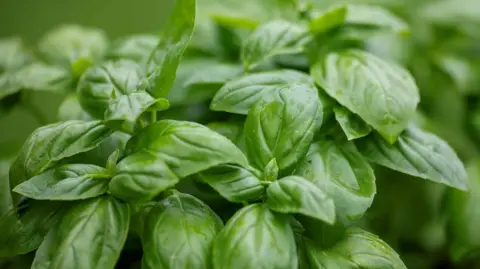 Getty Images
Getty ImagesWith climate change making life increasingly difficult for some farmers, and rising political tensions around the world often disrupting the food supply chain, a Berkshire company is looking at how we can become more self-sufficient.
The Innovation Agritech Group is growing crops indoors 365 days a year.
Hard to grow in the British climate, basil, coriander and lettuce leaves are being nurtured on a series of 16ft by 16ft (5m by 5m) vertical panels.
Italy this is not, but, at IAG's indoor farm in Bracknell, the agricultural technology company is looking at providing herbs and foods in the UK all year round.
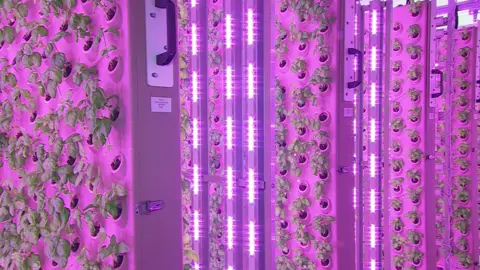
Farmers fear what a prolonged dry spell will mean for harvests later this year. Last year, England suffered its second worst on record.
When not looking after her 300 cattle on her farm near Swindon, Wiltshire, Liz Webster heads up the Save British Farming campaign group.
She said the changing climate is a huge challenge to her industry.
Government policies in recent years have prioritised the environment over food production, she said, adding: "We have exposed ourselves to a huge deluge of imports, which is destroying our home production and that's plainly ludicrous."
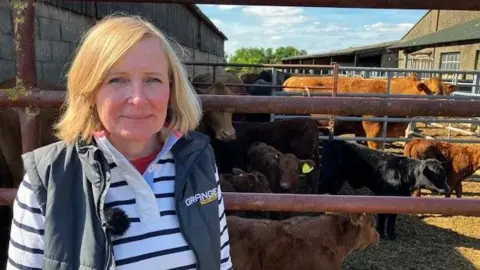
Experts such as the University of Reading's Prof Richard Tiffin have said while the UK does import huge quantities of fruit and vegetables, it is more self-sufficient than most, at least when it comes to the basics.
The director of science said it was a different story when it comes to soft fruits and more exotic vegetables.
"We're about 75% self-sufficient when it comes to things we can produce domestically. In fruit, we're probably around 15% self-sufficient," he said.
"However, the last thing you want is to be 100% self-sufficient. Not only is it extremely difficult to achieve but that also means you're at the behest of the weather in your own country."
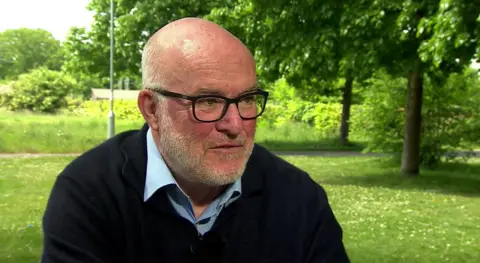
He said we could take a leaf from the Netherlands' book.
The Dutch are masters of growing the most fragile of fruits and herbs indoors, in tightly controlled environments, he said.
"They're a relatively small land country and it's undoubtedly the case the government has invested heavily in some of these indoor production facilities and we're probably behind that," said Prof Tiffin.
"They're a role model we should be following."
In Bracknell, IAG is taking the weather and climate change out of the equation, creating an indoor farm where every day is a perfect summer's day
The lighting system mimics the rise and fall of the sun, with the light each plant gets tweaked to suit the species' individual preference.
IAG's commercial director Dean Barron said plants in most indoor farms sit in water trays using a system called hydroponics
But IAG is planting individual seedlings in coir plugs, where minimal water is used.
He said: "We use a system called aeroponics because we believe that getting oxygen to the roots is a lot better than having it stood in water."
The system uses 95% less water than standard agriculture and 30-35% less than hydroponic processes, said Mr Barron.
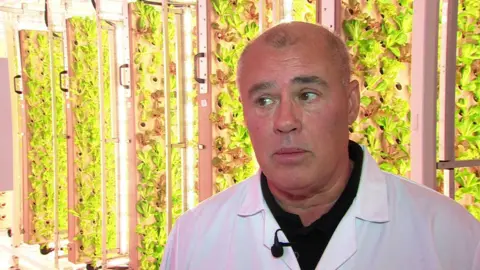
Growing everything this way means they are also immune from outside events like the war in Ukraine or the flash floods which hit parts of Spain last autumn, destroying thousands of hectares of fruit and vegetables.
"We can grow in here 365 days a year. Border closures don't then come into play so we won't have to rely on imports that way either, whether that be by sea, air or whatever.," Mr Barron said.
Indoor farming is just one of the solutions being looked at to make our food sector more secure.
But there is one big problem - power costs.
Facilities like IAG's hoover up large amounts of electricity.
No-one is suggesting we should be aiming to produce everything indoors but Prof Tiffin said we could do much worse than follow the lead of the country better known for tulips, windmills and clogs.
